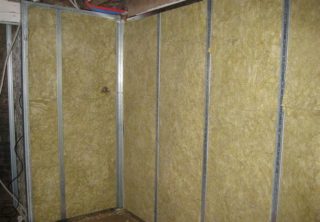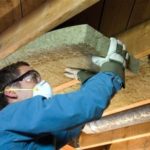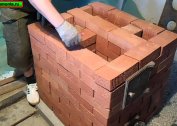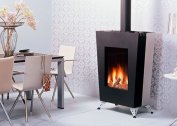The use of insulation allows you to maintain a comfortable temperature in the house without unnecessary heating costs. When choosing thermal insulation, many factors are taken into account, including its ability to absorb noise. Sound insulation is an important factor for urban housing. The quiet life in the apartment is disturbed by street noise, the movement of the elevator, and neighbors. Soundproofing Rockwool is a stone wool fiberboard designed to effectively absorb sounds. The material is environmentally friendly and non-combustible. It will provide silence and warmth in a residential building or office.
Rockwool Trademark History
Rockwool is an international company founded in Denmark in 1909. She began to engage in the production of thermal insulation since 1937. Brand products are valued worldwide for high quality and affordable cost. The main assortment of the company is stone wool products. Rockwool brand factories were built in 18 countries, including Russia. The manufactured goods are used in the construction of residential buildings and industrial buildings, shipbuilding. Stone wool slabs are used to protect against fire, sound insulation and insulation. High production capacity and European quality of products allowed Rockwool insulation to take a leading position in the market for construction products.
Advantages and disadvantages of the material
Mineral wool insulation from Rockwool Series Acoustic Butts have a fibrous structure that allows you to damp sound waves. When forming the material, the fibers stack randomly. Many air cavities are formed that contribute to sound absorption. Insulation plates are elastic and durable. They easily fit into the frame, do not crumple under load. A significant plus is the environmental friendliness of the material. Basalt cotton wool can be used for interior decoration of residential premises. Soundproofing Rockwool is recommended for children and medical facilities.
The advantages of insulation include:
- Low thermal conductivity - stone wool material does not conduct heat well. This property allows you to provide a comfortable temperature in winter cold and summer heat.
- Effective sound insulation - acoustic plates reduce the level of extraneous sounds to an acceptable level. They protect against airborne and impact noise.
- Fire safety - mineral fibers can withstand high temperatures without ignition and smoke. Basalt wool prevents the spread of fire.
- Easy installation - the insulation is sold in the form of lightweight plates that easily fit on an insulated surface. To work with them does not require special tools and knowledge.
- Vapor permeability - Rockwool Acoustics Butts' fiber structure provides unhindered penetration of water vapor. The room creates a favorable microclimate without excess moisture.
- Biological resistance - basalt wool is not subject to decay, fungi develop on it. Rodents arrange their homes in heaters.
- Water resistance - the use of special impregnations reduces the absorption of moisture to 1.5%.
- Rockwool materials for soundproofing walls are offered at affordable prices.
Disadvantages:
- When basalt wool is wet, its heat-insulating properties are reduced.
- In some people, mineral insulation causes allergies.
The amount of merit outweighs the disadvantages.In addition, with proper installation, the residents of the house will not notice the disadvantages of thermal insulation.
Specifications
When choosing a heater, it is important to study its operational characteristics:
- Thermal conductivity - 0.035-0.038 W / (m * K).
- Compressibility - less than 12%.
- Vapor permeability - 0.3 mg / m * h * Pa.
- Fire hazard class - NG, it is absolutely non-combustible insulation.
- Water absorption - 1.5% by volume when immersed in water.
- The maximum working temperature is 1000 ° C.
- Sound insulation index - 43-59 dB, the indicator depends on the thickness of the layer.
Parameters of Acoustic Butts slabs:
- length - 1000 mm;
- thickness - 40-200 mm;
- width - 600 mm;
- density - 35-45 kg / m3.
The Acoustic Butts Pro series has a thickness of 27 to 200 mm and is characterized by an increased density of 60 kg / m3. The manufacturer indicates a life of 50 years, but the insulation will last longer.
Popular thickness Rockwool Acoustic
Among a wide assortment of standard sizes of insulation, 3 types of plates are most popular in the construction and repair.
100 mm
Rockwool basalt cotton wool has excellent heat-saving characteristics. It meets all the requirements for acoustic materials. During operation, the plates are not deformed. They are protected from moisture by water repellent impregnation. A thickness of 100 mm is a popular option due to its wide range of applications. A common way of installing sound insulation is a frame partition with drywall sheets. To reduce the transmission of acoustic vibrations along the metal profile, a sealing tape is laid on it.
50 mm
Material with an average thickness is made from basalt rock. The random arrangement of the fibers in the acoustic plate allows you to reduce the noise level to 63 dB. Universal insulation is used for frame partitions, ceilings, floors. It has a density of 40 kg / m3. Plates are hydrophobized, they are not afraid of moisture.
27 mm
The plates with the smallest thickness are called Acoustic Ultrathin. They actively absorb medium and high frequency sounds. The material has a high density, so its effectiveness is comparable with thicker plates. The insulation is safe for health, suitable for children's rooms. Its main advantage is the minimum consumption of free space. Depending on the type of construction made and when using sealing tape, it reduces extraneous sounds to 57 dB.
Application of thermal insulation materials Rockwool
Basalt wool insulation is used for all types of rooms. They are compatible with various surfaces: wood, concrete, brick, metal. The product line has materials for thermal insulation of the foundation, basement, walls, floor and ceiling. Most boards are universal and can be used in several areas.
Walls
With Rockwool acoustic boards, soundproofing of walls can be done internally and externally. The insulation is mounted on the external walling or interior partitions. Before laying, the frame is assembled from metal or wooden guides. The step of the crate is equal to the width of the material - 60 cm. A moisture-proof and vapor-permeable membrane is attached over the sound and heat insulation. Partition walls with sound insulation filling are sheathed with drywall sheets. If necessary, basalt cotton wool is placed in 2 radas with an air gap of 50 mm between them.
Roof
Roof insulation is of particular importance, especially for the pitched structures of private houses, the Rockwool Scandic line has been developed. Material with a thickness of 100 and 150 mm is also used for attic rooms. The structure of the plates is designed for increased loads, they have the ability to restore their original shape.During installation, the use of a windproof membrane is mandatory. The flat roofs of multi-story buildings are insulated with products from the Roof Butts series. Dense slabs are used to create a soft roof.
Floor and floors
For insulation of horizontal constructions - floor and interfloor ceilings - Rockwool Flor Batts insulation is used. Rigid hydrophobized plates have a density of 100-125 kg / m3. They are designed for high loads, contribute to the attenuation of sound propagating from neighboring floors.
Baths and saunas
Rooms with high humidity and temperature require sound insulation and insulation with special materials. Sauna Butts plates are available with a single-sided coating of aluminum foil. The metallized layer reflects heat and reduces the wetting of cotton wool. Basalt insulation minimizes the risk of fire. It is made from environmentally friendly raw materials, does not mold from moisture.
- For the roof
- For a wooden bath
- For the floor
Technical
Conservation of energy resources is a significant aspect of industrial production. Rockwool basalt slabs are used for various tasks of insulation, sound insulation and fire protection of technical objects. They are installed on tanks, pipelines, process equipment and ducts. For effective sound absorption, the Industrial Batts 80 line has been created. Slabs of stone wool have a thickness of 35-100 mm. They are recommended for channels with an air velocity of 20 m / s. The noise reduction index depends on the thickness of the plates. When using Rockwool materials, sound insulation of ducts is carried out in a short time and with high efficiency.
Rockwool products are successfully used in private homes and apartments. For insulation and sound insulation, it is used by construction companies and craftsmen who make repairs with their own hands.










